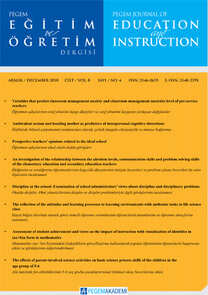Evaluating the Distance Learning Experience from the Point of View of College Members and Students at Aqaba University College
___
Affouneh S, & Salha S, & Khlaif ZN. (2020) Designing Quality E-Learning Environments for Emergency Remote Teaching in Coronavirus Crisis. Interdisciplinary Journal Virtual Learning Medical Sciences.11 (2), 1-3Al-Akhras, Y. (2018) The Impact of Applying the E-Learning Strategy on Academic Achievement in Mathematics in Basic Classes in the Capital Governorate from the Perspective of Mathematics Teachers, Journal of Educational Sciences Studies. 45 (4), 70-80
Al-Azzam, M. F. M. (2017) Quality assurance in open and distance learning. Journal of Education. 69 (158), 1-18.
Al-Hassan, I. I. K. (2014) The extent of the contribution of educational technology to the distance learning program in Sudanese universities. Journal of Educational Studies, Faculty of Education, International Africa University. No.3, 118-158.
Al-Mahmadi, G. A. T. (2018) Evaluating the reality of using the electronic learning system (EMES) in the distance education program at King Abdulaziz University from the students’ point of view. Journal of the College of Basic Education for Educational and Human Sciences. (39), 177-196.
Al-mula, A. A. (2016) Evaluating the distance education experience at the Malaysian University and the College of Education for females according to the quality standards taken from the Quality Assurance Agency for Higher Education - Britain. International Journal of Educational Research, Volume 39, UAE
Al-Zboon, K. O. M. (2020) The effectiveness of distance learning compared to direct education in the achievement of first-grade students in the Arabic language subject in Jordan. Arab Journal of Specific Education. 4 (14), 201-220.
Awad, M. S., & Halles &., Musa. S. (2015) The trend towards distance learning technology and its relationship to some variables among graduate students in Palestinian universities. Al-Aqsa Magazine, College of Education. 19(1), 219-256.
Basilaia, G., & Kvavadze, D. (2020) Transition to online education in schools during a SARS-CoV-2 coronavirus (COVID-19) pandemic in Georgia. Pedagogical Research. 5(4), 1-9.
Belbeisi, Mona Abdel Kader. (2017) The effectiveness of Al-Quds Open University students in the Salfit educational area in using distance learning skills and technologies. Journal of Palestinian Journal of Open Learning & E-Learning. 1(1), 355-402.
Kamal, S. A. (2002) Ensuring good quality in open and distance learning. Journal of Al-Quds Open University for Research and Studies. No.1, 25-50.
Visande, J. C. (2014) Developing Critical Thinking Skills among Educat ion Students Throug h Format ive Educat ion. International Journal for Cross-Disciplinary Subjects in Education (IJCDSE). 5(4), 1783-1789.
Yulia, H. (2020) Online Learning to Prevent the Spread of Pandemic Corona Virus in Indonesia. English Teaching Journal. 11(1), 48-56
- ISSN: 2146-0655
- Yayın Aralığı: 4
- Başlangıç: 2011
- Yayıncı: Pegem Akademi Yayıncılık Eğitim Danışmanlık Hizmetleri Tic. Ltd. Şti.
The Effect of Digital Literacy Towards The Selection of Social Science Teacher Learning Media
Sarintan N. KAHARU, Jusman MANSYUR
Examination of Gifted Students’ Internet / Game Addiction and School Social Behaviors
Ayşin Kaplan SAYI, Filiz ŞAHİN
Bambang Budi Wiyono, Asroful Kadafi, Muslihati, M. Ramli
Hanifah MAHAT, Saiyidatina B. NORKHAİDİ, Mohmadisa HASHİM, Nasir NAYAN, Yazid SALEH, Nurul H. L. ABDULLAH, Nur Hidayah BAHARUDİN, Nurakma JAMHARİ
Fatmanur ÖZTÜRK, Kürşad SERTBAŞ
Foreign Language Anxiety and Gifted Students in Turkey
Prospective Teachers’Views about Creating Websites for Social Studies Teaching in Distance Education
